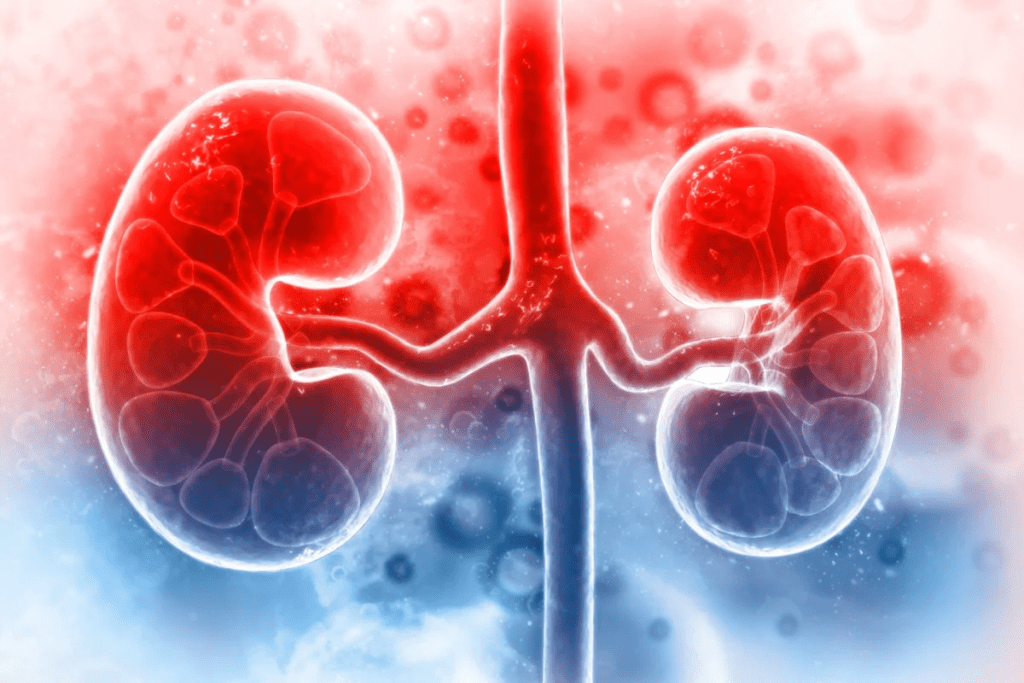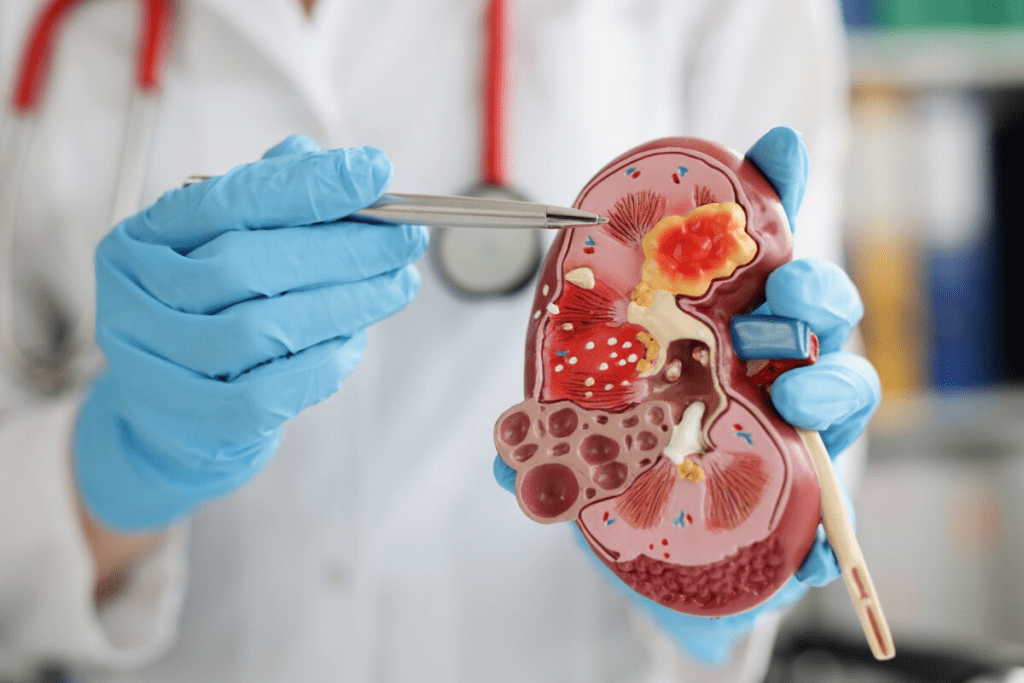Last Updated on November 25, 2025 by
What are the three warning signs of kidney disease? Learn the kidney failure symptoms. Crucial, powerful facts on swelling, fatigue, and urinary changes.
Kidney disease often starts without any obvious signs. It’s important to catch it early. Early action can greatly improve your health and life quality.
Recognizing the symptoms early is key to managing the disease well. The three main signs are changes in how you pee, swelling in your legs or feet, and feeling very tired or weak.

At Liv Hospital, we are committed to delivering world-class healthcare. We offer full support and guidance for international patients. This helps you take care of your health proactively.
Kidneys are key to our health, and problems with them can be serious. They filter waste, control blood pressure, and help make red blood cells. These jobs are vital for our body’s balance.
Kidneys do many important things for us. They:
These roles show how crucial kidneys are for our health. If they don’t work right, we can face toxin buildup, high blood pressure, and other issues.
Chronic kidney disease (CKD) is a big problem in the U.S., affecting over 35 million adults. It may sneak up on us, with no symptoms until it’s too late. This shows why we need to catch it early and act fast.
Some important facts about CKD are:
Knowing these numbers highlights the need to check our kidney health and take care of them.
Kidney disease often starts quietly, making it key to spot its early signs. Many people don’t know they have it until it’s too late.
Chronic Kidney Disease (CKD) grows slowly, often without symptoms at first. Routine urine and blood tests are vital to catch it early. These tests look for protein in the urine and a low glomerular filtration rate, signs of kidney trouble.
The kidneys filter waste, control blood pressure, and keep electrolytes balanced. When they fail, toxins build up in the body.

Scarily, about 9 in 10 people with CKD don’t know they have it. This shows the importance of education and screening, especially for those at high risk. Diabetes and hypertension increase the risk of CKD, so those with these conditions need to watch their kidney health closely.
Knowing the early signs of kidney disease, like frequent urination and kidney pain, can help. Early action can slow the disease’s spread.
Noticing changes in your urination patterns can be the first step in identifying potential kidney problems. Our kidneys filter waste and excess fluids from the body. Changes in urination can signal kidney issues.
One common change is an increased frequency of urination, especially at night, known as nocturia. This happens when kidneys can’t concentrate urine well. It leads to more bathroom trips. If you wake up often to urinate, talk to your healthcare provider.
Another significant change is blood in the urine, or hematuria. Occasional blood might not be a big deal, but persistent blood is a sign of kidney damage or disease. If you see blood in your urine, get medical help.
Urine that looks foamy or bubbly can mean protein leakage, or proteinuria. Normally, kidneys filter waste and keep proteins. But when kidneys are damaged, proteins leak into urine. This makes urine look foamy or bubbly.
Recognizing these changes in urination patterns is key for early detection and management of kidney disease. If you’re experiencing any of these symptoms, see your healthcare provider. They can help find the cause and the right treatment.
Kidney disease can show itself in many ways, like swelling in the legs and feet. This happens because the kidneys can’t get rid of extra fluids and waste. This buildup of fluid causes swelling, or edema, in different body parts.

Swelling often shows up in the ankles and feet. It gets worse after standing or walking for a long time. This swelling means the kidneys aren’t working right to filter waste and fluids.
To spot ankle and foot edema, look for puffiness or swelling. The skin might feel tight or heavy.
Swelling can also happen in the face, especially around the eyes. This puffiness is a sign of fluid buildup. In the morning, after sleeping, fluid can gather around the eyes, making them look puffy.
This symptom can be an early sign of kidney problems.
The kidneys are key to keeping the body’s fluid balance. When they’re sick or damaged, they hold onto more sodium and water. This leads to fluid buildup in the body.
This condition causes swelling in the legs, ankles, feet, and face. Knowing how fluid retention relates to kidney health is important for catching kidney disease early.
Persistent fatigue and weakness are key signs of kidney disease. When kidneys don’t work right, toxins build up. This makes us feel tired and weak.
Kidney problems can cause anemia. Anemia means fewer red blood cells. Red blood cells carry oxygen, and without enough, we feel tired and weak.
Also, kidneys make a hormone called erythropoietin. This hormone helps make red blood cells. If kidney function drops, erythropoietin production falls too. This leads to anemia and fatigue.
Anemia and kidney disease are closely linked. Anemia is a common problem in chronic kidney disease. It makes patients feel tired, weak, and short of breath.
As kidney disease gets worse, doing daily tasks gets harder. Simple things become a challenge. This affects work, social life, and self-care.
Seeing fatigue and weakness as signs of kidney disease is important. If you feel this way, see a doctor. They can find the cause and help you.
Several key factors increase the likelihood of developing kidney disease. Understanding these risk factors can help individuals take preventive measures and seek early diagnosis.
Diabetes is a leading cause of chronic kidney disease (CKD). 1 in 3 people with diabetes will develop CKD. High blood sugar levels over time can damage the blood vessels in the kidneys, reducing their ability to function properly.
Managing diabetes through lifestyle changes and medication can help mitigate this risk.
Hypertension, or high blood pressure, is another major risk factor for kidney disease. 1 in 5 individuals with hypertension will develop CKD. Controlling hypertension can help protect kidney health.
A family history of kidney disease can increase an individual’s risk. Certain genetic conditions, such as polycystic kidney disease (PKD), can directly cause kidney disease. Discussing your risk with your healthcare provider is essential.
Age is a significant risk factor, with the risk increasing after 60. Obesity is another contributing factor, often associated with conditions like diabetes and hypertension. Maintaining a healthy lifestyle can help reduce the risk.
Other factors include smoking and exposure to toxins. A balanced diet and regular exercise are recommended.
Kidney health testing is key to preventing problems. It helps find issues early. We use different tests to check how well the kidneys are working.
People at risk, like those with diabetes or high blood pressure, need regular tests. These tests help spot kidney issues early. This way, we can manage the condition better.
The Glomerular Filtration Rate (GFR) test shows how well the kidneys are working. It measures the amount of fluid filtered by the kidneys. A lower GFR means the kidneys are not working well.
To calculate GFR, we use a formula based on age, sex, and creatinine levels. This test is important for diagnosing and tracking kidney disease.
The albumin-to-creatinine ratio (ACR) test checks for protein in the urine. High ACR levels mean kidney damage. Healthy kidneys keep proteins from getting into the urine.
This test is especially important for people with diabetes. It helps find kidney damage early and check if treatments are working.
A Comprehensive Metabolic Panel (CMP) is a blood test. It gives important info about kidney function and more. It checks for electrolytes, waste, and other substances.
The CMP shows signs of kidney problems, like abnormal levels of creatinine and electrolytes. It’s useful for diagnosing and managing kidney disease. It also helps check overall metabolic health.
Tests like GFR and albumin-to-creatinine ratio are key for early kidney damage detection. Adding a comprehensive metabolic panel gives a full view of kidney health. This helps doctors create a good treatment plan.
It’s important to know the early signs of kidney disease to keep your kidneys healthy. Understanding the risks and symptoms helps you act early. This can lead to better treatment and outcomes.
At Liv Hospital, we focus on caring for those with kidney disease. Our team supports you from diagnosis to treatment and beyond. We’re here to help you every step of the way.
Early detection and a team approach can slow down kidney disease. This reduces the chance of serious problems. By focusing on kidney health and getting help when needed, you can stay well.
Knowing about kidney disease and its symptoms is key to managing your health. We’re here to help you understand and take control of your health. Let us guide you through this journey.
Early signs of kidney disease include changes in how you urinate, swelling in your legs or feet, and feeling very tired or weak.
Your kidneys are in the lower back, one on each side of your spine.
Kidney failure symptoms are nausea, vomiting, swelling, feeling very tired, and changes in how you urinate.
Doctors use tests like the glomerular filtration rate (GFR) and albumin-to-creatinine ratio to find kidney disease. They also do a comprehensive metabolic panel.
Risk factors include diabetes, high blood pressure, family history, age, and being overweight.
While some risks can’t be changed, a healthy lifestyle helps. Managing diabetes, high blood pressure, and regular check-ups can prevent or delay kidney disease.
Liver and kidney diseases can be linked. Some conditions affect both organs. Liver problems can also harm kidney function.
HIV raises the risk of kidney disease. Some HIV treatments can also harm the kidneys.
Frequent urination, especially at night, is a sign of kidney disease. It means the kidneys can’t make concentrated urine.
Yes, anemia is common in kidney disease. The kidneys make erythropoietin, a hormone that helps make red blood cells.
Subscribe to our e-newsletter to stay informed about the latest innovations in the world of health and exclusive offers!